An insurgent mother uploads the consciousness of her tragically killed daughter, Iris, into a stolen synthetic body. Torn out of her idyllic digital world and left on the run in an oppressive futuristic city, Iris must confront her body's objectification and its violent capabilities, as well as the consequences of her mother's actions.
I’m always on the lookout for interesting crowd-funded projects. Even though platforms such as Kickstarter or IndieGoGo might have lost a bit of their shine and popularity in recent years, it’s always great to see independent projects from unknown creators break through and grab our attention.
The short film Venus (now in post-production with a final Kickstarter campaign to get it over the line) grabbed my attention immediately with its slickly produced trailer and interesting concept that puts a twist on the usual themes. Although the trailer uses many of the enticing tropes – including a reverb-heavy synth soundtrack and neon colour palette – that the cyberpunk genre (almost ruthlessly) demands, it’s clear that something a bit different was being presented that aims to take things further.
Today, I’m delighted to share with you an interview with Director/Co-Writer/Editor of Venus, Andrew McGee, as he talks to us about some of the themes of the film and where he feels the Cyberpunk genre as a whole needs to go next.
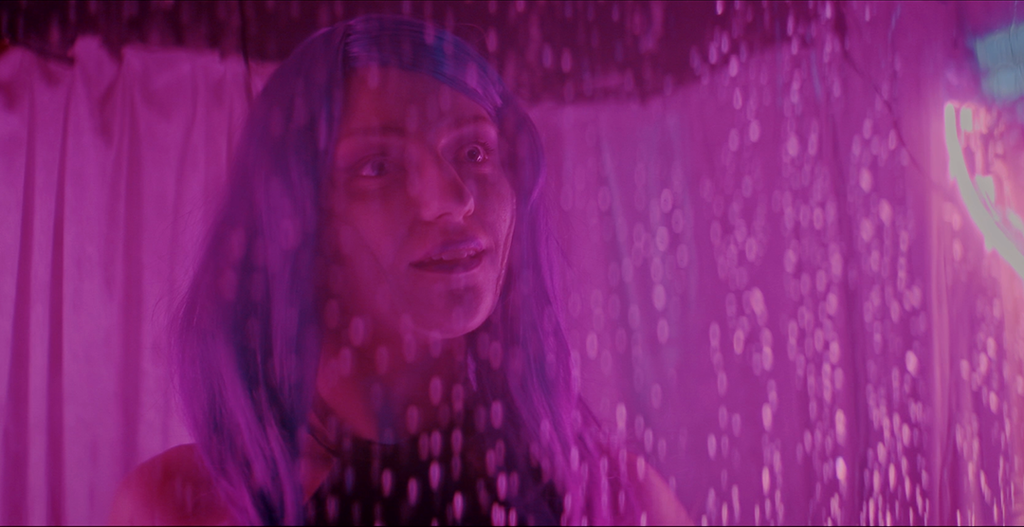
Cyberpunk is a genre filled with heavy influences. What are some of the key influences for this short film (visually and thematically)?
AM: My major points of reference include Ex Machina, in terms of its approach to a female artificial intelligence and themes surrounding identity and the human body, and Under the Skin for similar reasons. Obvious references include Blade Runner and Blade Runner 2049, both thematically and visually – they’re archetypal of the genre, and their beautiful cinematography and set designs were certainly an influence in our choice of framing and use of light and shadow.
One conceptual jumping off point was the already iconic scene in Blade Runner 2049, in which K looks up at the giant hologram of Joi, who’s a hollow shell of the Ana De Armas character we come to know throughout the film. Their relationship raises plenty of interesting concept – a replicant finding companionship with an AI, love without touch – but I wondered how that scene would have played out on a personal level if Joi was the one interacting with that uncanny, sexualised billboard projection of herself.
I also find the original Ghost in the Shell quite fascinating in its subtextual approach to gender and the way it blurs boundaries, and Altered Carbon certainly came to mind while we were getting our heads around the idea of uploading yourself into a new body.
What areas of the genre does this project explore in a different way than others have done in the past?
AM: One of the main angles myself and Tara Shehata, the film’s co-writer, were keen to explore with Venus is the representation of women in the genre, especially in terms of objectification and viewing these typically male-dominated worlds from a female perspective. We’re used to seeing cyberpunk futures from largely a male point of view, running with the film noir influences of hard-boiled detectives or outsiders exploring seedy, low-life urban underworlds. It’s part of the iconography – including the mostly-naked sex workers/androids – but for a genre so interested in the commodification and modification of the body there doesn’t seem to be a substantial engagement with these topics, or the wider implications of ideas like androids designed for pleasure.
It seems like an obvious approach with so much story potential, especially now that we’re in the process of re-evaluating the representation of women on screen; as well as crucial real-world issues of objectification and exploitation.
Most of the cyberpunk artwork I scroll through on, say, Instagram are largely women with unrealistic proportions bursting out of shiny catsuits, surrounded by cables and holograms. The genre has far more to offer beyond those popular surface aesthetics, and I felt it was something worth interrogating.
These ideas are all embedded into a tense and exciting narrative which still embraces all the pleasures of cyberpunk, while being grounded in quite an intimate story between a mother and daughter and dealing with ideas of grief. It’s important in any work of fiction for the characters and emotional stakes to be relatable, even amidst all the big ideas and sci-fi strangeness.
Are there any other aspects of the cyberpunk genre outside of this project that you think need to be more fully explored?
AM: The trouble with cyberpunk is how static the genre has remained over the decades – if you deviate too far from its common tropes then it’s no longer cyberpunk, so it’s hard to find new aspects to explore. Studios also need a return on their investment so have to attract a wide audience, which is a roadblock for more experimental ideas and the philosophical side of the genre might be watered down in favour of action. It’s hard to strike a balance like The Matrix, and both Blade Runner films were far from box-office hits due to a lack of mainstream appeal.
However, with new technology becoming available like the LED screen used in The Mandalorian, I think there’ll be more freedom to make interesting cyberpunk films. I’d like to see the weirder sci-fi aspects on screen; what cyberspace could really look like, humanity reaching the point of singularity – somehow cinematically presenting all the unimaginable descriptions of the future we read in novels.
On the other hand, I’d like to see more intimate stories – why not set an indie character drama in the future? Sci-fi opens up so many possible, very human stories, which I think something like Black Mirror has done well.
Oh, and more straight-up violent cyberpunk action films please, like Dredd or Upgrade – they’re both such a blast.
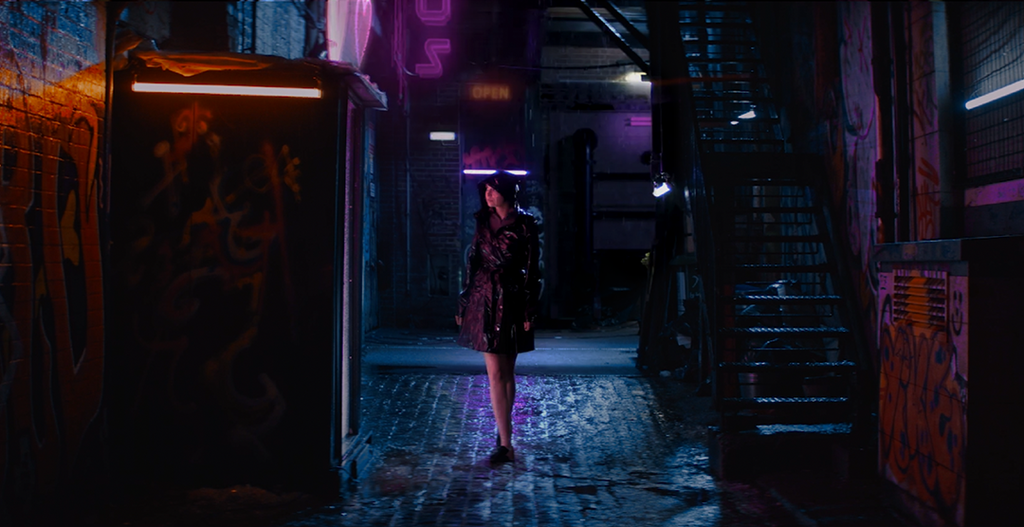
Looking at it from a technical standpoint, the trailer you’ve presented is extremely impressive and tightly produced. Any tips or secrets of the trade you’re willing to share with other independent filmmakers?
AM: Thank you! I’m an editor professionally so part of the process was instinctive, but I started off by selecting all the moments and shots I wanted to show off, while working out how to convey enough of the story without spoiling anything. It was a tough balance between intriguing the viewer and not showing too much, since it’s a 14-minute film and still has to be a completely fresh viewing experience.
Before I began putting the shots into the timeline, I created an audio track by combining part of the score by the film’s composer Tracie Turnbull, with a demo track created by two close musician friends, BRTHR and Luke Fincher. I didn’t have to do an awful lot from there; the music happened to come in a one minute with a ready-made structure, and combined with the shots I’d selected it just worked! Our sound designer Will Morton did a stunning job on the punchy sound effects too.
It’s great fun editing trailers – there’s no need to worry about direct continuity between shots or scene dynamics, the aim instead is to create as much impact and intrigue as possible in a condensed timespan. I love editing music videos for the same reason, there’s so much creative freedom in the edit.
Kickstarter and other crowd-sourcing platforms seem to have come down from their peak of popularity. Do you still feel this is the best approach for new projects?
AM: I agree that crowdfunding does seem to be passed its prime, though I’m not sure how else I could have possibly funded this film. We also ended up being incredibly lucky with support from generous individual investors, but before that I applied to many grants and funds – pretty much all of them in fact – and didn’t have much luck; the furthest we got was the ScreenCraft Film Fund, which is one of the biggest international screenwriting competitions and the Venus screenplay was a finalist, so that was a huge boost (just not financially!).
The truth is there just aren’t many short film funds, and all are extremely competitive (the combined expense of applying is often better put towards your budget). There also seems to be a bias towards films dealing with social issues and realism, and while it’s absolutely essential those stories are told, it feels like genre cinema still has to prove itself at an independent level. Yet at the box office, sci-fi and horror in particular seem to making an impact by addressing the pressing issues of our time.
Finding an audience directly on Kickstarter who would be willing to fund the project allows creators to overcome that funding struggle, as well as the need to find an audience afterwards.
Of course, there are plenty of examples of backers being let down by crowdfunds, and there’s no guarantee the product/reward/film will be delivered in time or up to standard (or at all, in some cases). Those who back projects are putting a great deal of faith into the creators, and the more campaigns that abuse that relationship, the more unappealing crowdfunding becomes. I imagine this risk, combined with the waning novelty and oversaturation of the platforms, is the cause of its decline over the last few years. I don’t think it’s in danger of dying out however, and even during the pandemic when money is tight, we hit our goal in under two weeks. The real challenge is standing out from the thousands of other projects looking for funding.
Tell us about the team behind the project. Have you worked together before? How did it all come about?
AM: I’d previously co-written a short film with my writing partner Tara called The Shadow of Cairo, about sexual harassment in Egypt with a superhero twist. It ended up doing incredibly well, and screened last year at the Academy-qualifying New York International Children’s film festival and was one of the Jury Prize Finalists – the panel included Taika Waititi and Uma Thurman which was amazing.
Having had Venus in mind for a while, after developing it from an idea that came out of a discussion with another filmmaker friend called Ben Sunnucks, I knew a female perspective was crucial for the film, and Tara and I worked so well together previously.
It was a first-time collaboration with producer Claudia Kaleta who loved the concept, as well as Director of Photography Miguel Cármenes, who’s simply incredible as you can see from the trailer. I met Claudia and Miguel through Tara, who had all graduated from Met Film School the previous year.
I’d also worked with our production designer Jason Kelvin before on my last sci-fi film, which was set on the International Space Station as the world came to an end – simple stuff! He built a whole cross-section of the station, so our cyberpunk settings seemed like a logical next step. The rest of the team was a mix of old and new faces, built from a growing network of ambitious filmmakers keen to be involved in this passion project, who gave it their all despite the tough filming conditions.
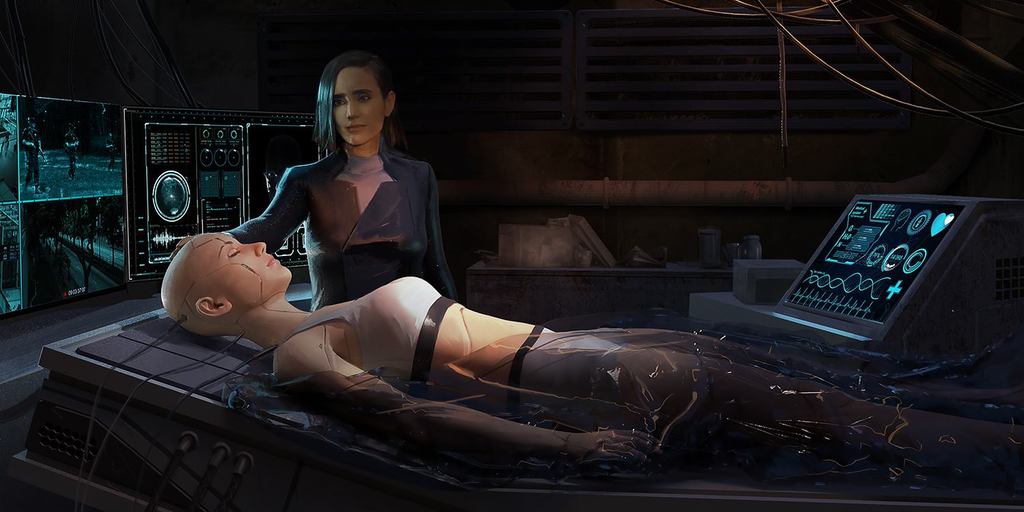
Is this project leading on to any other strands of work once it is completed? Is it a world you want to continue and develop more broadly, or more of a one-off statement?
AM: Yes! While Venus is a self-contained short, the plan is to also use it as a proof of concept to pitch a feature film. I’m still very much invested in this world even after working on it for so long, and I have the full story laid out in my mind which I’ll be writing as soon as the short is complete.
The difficulty with sci-fi, and cyberpunk in particular, again inevitably comes down to budget, and I can’t realistically expect the budget of something like Alita: Battle Angel for a debut feature if I’m lucky enough to develop it. The feature-length story would keep the same epic cyberpunk scale while remaining quite an intimate and contained character-driven story, dealing with similar concepts and expanding on other areas I’m interested in. This short would essentially be the beginning of the film and I’m very excited by the prospect, I really hope I can get it off the ground.
Future Conscience is a website that asks the question: ‘what do we want to be?’ This seems particularly relevant to the themes of your film, so I’d be interested in hearing your thoughts on that notion…
AM: What a fascinating question. Right now I find it difficult to contemplate “we” as a collective when the world seems more divided and violently polarised than ever, but my hope is that the current instability eventually paves the way for a better and kinder future.
Dystopias reflect the worst aspects of our world and push them to their most nightmarish extreme – as cool as they might look, most works of cyberpunk are a warning of government oppression, overwhelming corporate control, population segregation, etc. In Venus, Iris is uploaded into a body that isn’t her own (or even her own ‘property’), and is hunted by the violent authorities due her mother’s insurgent actions. The “punk” part of the genre is a rebellion against control, and I think what we all want to be is free as individuals – free to live our lives without oppression or injustice, free to live without being hunted by a relentless military drone…
Even right now, we’ve all had to sacrifice the socialising and travel we always took for granted, for our own safety and the safety of others, and we’re looking forward to regaining that freedom. The idea of ‘freedom’ is loaded with centuries-worth of discussion and contradictions, and I’m sure there won’t be a consensus in the next few centuries either, whatever form humanity might take. Greed and violence might just be hardwired into humanity, but I’m hoping the world of Venus isn’t what we’re heading towards.
Thank you, Andrew!
You can follow the project on the usual social media channels:
Twitter / Instagram / Facebook
The final phase Kickstarter has hit its goal, but is still running and I highly recommend you go and show them some support by pledging to help the project. It’s clear that Andrew and the rest of the team behind Venus are highly talented and the project has a vision that deserves to be seen as widely as possible.
Beyond that, they’ve got some absolutely killer pledge rewards available – more than the usual ones you might get for a film project. Which is why I was delighted to pledge at the Make_It_Rain level…
*cue Vangelis*
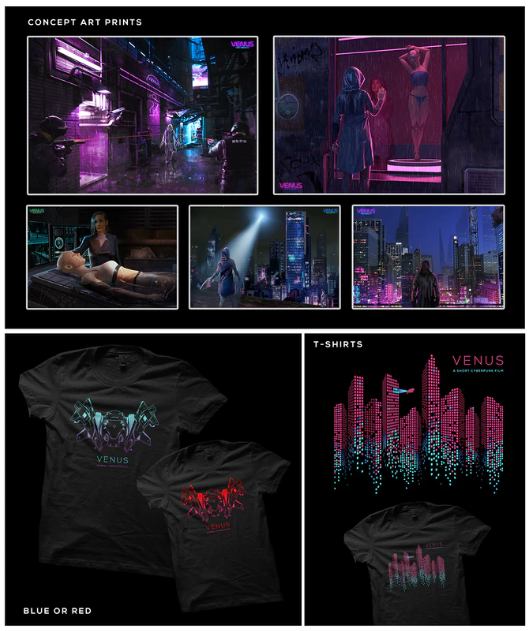

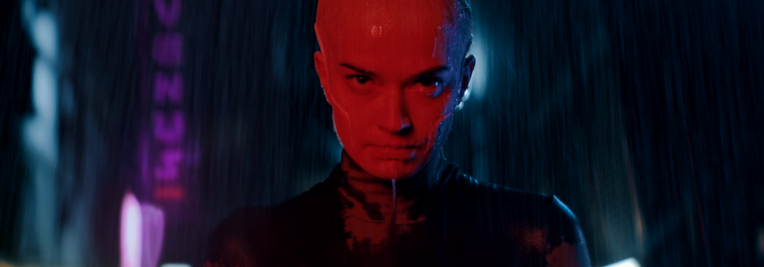
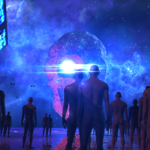


![[Review] VENUS: A Cyberpunk Short Film Venus Film Title Screen](https://www.futureconscience.com/wp-content/uploads/2021/02/Venus-Review_Title-150x150.jpg)